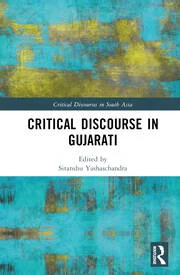Critical Discourse in Gujarati
Critical Discourse in Gujarati is a remarkably well-argued and well-documented study. The author contends that Gujarati critical thought about literature did not begin with 19th century critics like Navalram, Narmad and Dalpatram, which is the prevailing view of many historians and editors of anthologies. Rather, there is a longer prehistory of critical thinking in Gujarati that has been neglected. In a radical departure from entrenched historiographies of Gujarati literature, the author draws in, for the first time, forcefully articulated critical thought in verse (and not prose) from such writers as the fifteenth century scholar-poet Bhalan, followed by Akho, Premanand and Shamal in the seventeenth and eighteenth centuries. The result is a bold revision of Gujarati literary historiography which, through painstaking documentation, brings a serious and sustained look at a longer critical discourse in Gujarati.
This study’s intellectual energy hinges on the elusive category of Gujarat, Gujarati, Gujarati literature, Gujarati culture, which takes in the sweep of the region’s confounding, and yet attractive, heterogeneity. It proposes a number of angles through which to perceive the waves of Gujarati literary life, not the least of which is what the author translates as “variation” (vivarta). The emphasis of the volume is on the conceptual weight that “critical discourse” carries: as both a criticism of presumably uncritical discourses about Gujarati over the past hundred years or so but also an imaginative thinker’s piercing forays into the complexities of the subject taken critically.
One such subject is the artificial divisions often given to shared practices which can be dubbed as “literary criticism.” The author seems vexed by the literary historian’s obsessions for maintaining predetermined rubrics to study Gujarati literature, instead of granting the subject a unique vitality of its own, thus finding stale discussions about the nominally old or new, the colonial or pre-colonial, the supposedly significant differences inherent to using poetry instead of prose, etc. One particular issue the author grapples with concerns literary periodization rubrics (renaissance, reform, etc.), challenging their universality and legibility across global literatures. While simultaneously adapting such organizational principles that sensibly aid understanding the history of Gujarati literature, this book resists viewing all things as either regional or national, ineluctably local or inarguably universal.
It also leads to reconstructing a history of publication in manuscript and journal, convergences of poetry and music in the region, the significance of institutions (the move, for example, from Bombay University to Gujarat Vidyapith as the locus of Gujarati literary culture), and the importance of the Gandhian period—with its push for a “critical federalism” and critical fashioning round satyagraha and sarvodaya—and the post-Gandhian period, which culminates in Gujarati’s global reach.
Prof. Deven M Patel,
Associate Professor,
Department of South Asia Studies,
University of Pennsylvania.
Philadelphia, USA.
(His Publications include Text to Tradition: the ‘Naishadhiyacharita’ and Literary Community in South Asia. Columbia University Press, 2014.)
* Introduction essay by Sitanshu Yashaschandra
